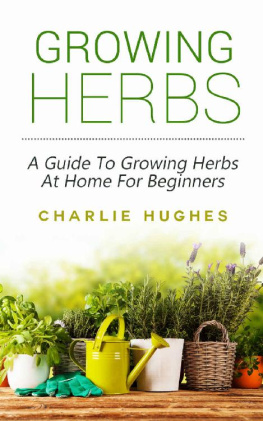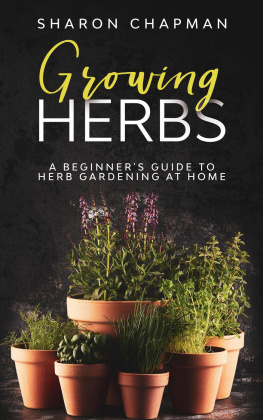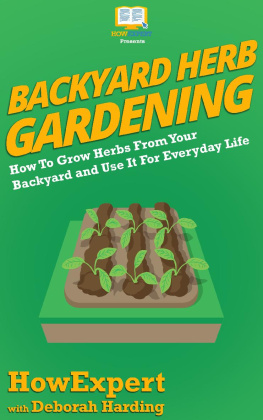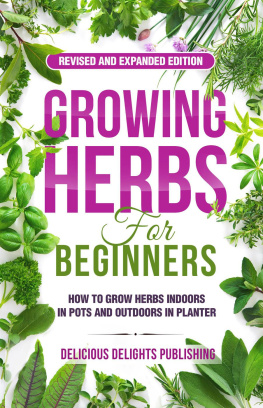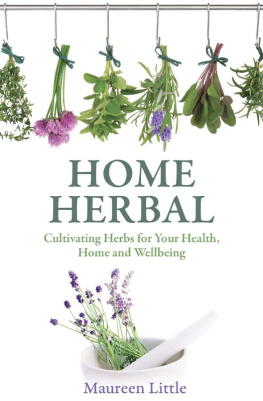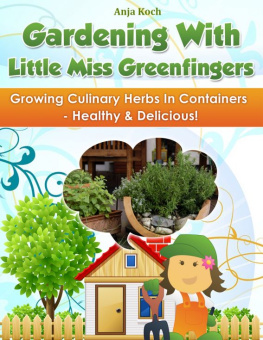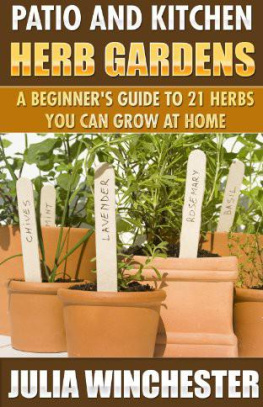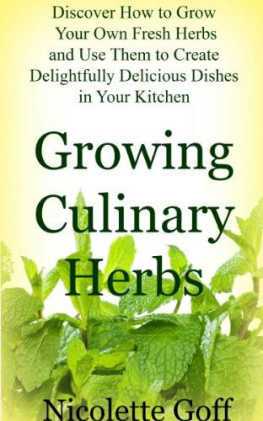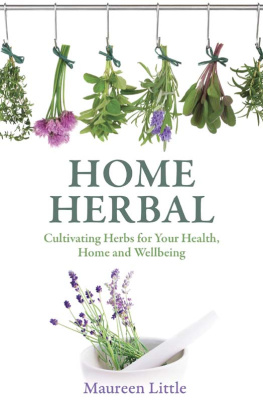Growing Herbs at Home
A Guide to Growing Herbs At Home for Beginners
By Charlie Hughes
(c) Copyright 2015 by Charlie Hughes - All rights reserved .
This document is geared towards providing exact and reliable information in regards to the topic and issue covered. The publication is sold with the idea that the publisher is not required to render accounting, officially permitted, or otherwise, qualified services. If advice is necessary, legal or professional, a practiced individual in the profession should be ordered.
- From a Declaration of Principles which was accepted and approved equally by a Committee of the American Bar Association and a Committee of Publishers and Associations.
In no way is it legal to reproduce, duplicate, or transmit any part of this document in either electronic means or in printed format. Recording of this publication is strictly prohibited and any storage of this document is not allowed unless with written permission from the publisher. All rights reserved.
The information provided herein is stated to be truthful and consistent, in that any liability, in terms of inattention or otherwise, by any usage or abuse of any policies, processes, or directions contained within is the solitary and utter responsibility of the recipient reader. Under no circumstances will any legal responsibility or blame be held against the publisher for any reparation, damages, or monetary loss due to the information herein, either directly or indirectly.
Respective authors own all copyrights not held by the publisher.
The information herein is offered for informational purposes solely, and is universal as so. The presentation of the information is without contract or any type of guarantee assurance.
The trademarks that are used are without any consent, and the publication of the trademark is without permission or backing by the trademark owner. All trademarks and brands within this book are for clarifying purposes only and are the owned by the owners themselves, not affiliated with this document.
History and uses of herbs
What is Paradise? But a Garden, an Orchard of Trees and Herbs, full of pleasure and nothing there but delights. William Lawson, explorer, 1618
The purpose of this book is to help you cultivate your own little corner of paradise on a balcony, roof terrace or even a windowsill indoors. One of the many delights of herbs is their versatility - they dont necessarily need a garden to become verdant, productive and delicious.
Most people grow herbs for use in cooking - to complement or enhance the flavours of dishes. Think how rosemary and mint enhance lamb, or how dill complements salmon. Fresh herbs taste fresher and stronger than dried herbs, and if you use them straight after picking youll enjoy not just intensity of flavour, but also higher vitamin content.
For millennia, man has had a fond, sometimes mystical, and often essential, relationship with herbs, for medicinal as well as culinary reasons. Herbs were not only used to flavour and preserve food or disguise the taste of old meat, they were also recognised for their health benefits.
For example, Ayurveda, the holistic Indian healing system that dates back 5,000 years, relies heavily on the use of herbs and spices in medicine and food to balance the body and mind. Between 300BC and 200AD, a book on medicinal plants and agriculture was written in China, based upon knowledge handed down by Emperor Shen Nong (The Divine Farmer) who lived around 2800BC. As well as documenting methods of seed preservation, the book described over 300 plants, listing their medicinal uses and categorising them in terms of strength and toxicity.
At around 1550BC, the Egyptians recorded some 700 plant-based remedies for common medical complaints on a 20-metre scroll of papyrus, now known as Ebers Papyrus. Later, Hippocrates in the first century BC and Galen in the second century AD developed Greek herbal medicine - considered the foundation of modern medicine - for the treatment of ailments. More recently, colonists and settlers in the Northern and Southern hemispheres discovered local herbs and plants that had been used for medicinal purposes by the indigenous populations for aeons. An example is Echinacea, native to North America, which is still used today for the treatment of common infections.
Today, 80% of botanicals-based pharmaceutical drugs are used to treat the very same conditions identified by herbalists of the past. The healing power of plants has certainly stood the test of time and its reassuring to think that something so natural forms the basis of modern medicine. And the fact that herbs are so good for you is another great reason to grow them yourself and include them in your cooking.
Getting started
Your first step is to decide which herbs you want to grow and whether youll be growing them from seeds, young plants or cuttings. Wherever possible, use organic seeds, plants or cuttings from reputable suppliers: many herbs are used raw in dishes and you will want to minimise the pesticides and chemicals you consume.
Different herbs have different requirements for healthy growth, so if youre new to gardening its best to start out by growing a small selection of herbs that you know you will use, before becoming more adventurous later with the benefit of experience.
Most herbs like to grow in well-drained soil, so the containers you select should have drainage holes at the bottom. Put a few stones or pebbles in the base of the pot and add gravel to the growing medium to further improve drainage. The best type of container for herbs are unglazed clay pots, because they allow soil to dry out in between watering, prevent overly-wet roots and allow for the circulation of air. At first you should aim for a separate pot for each type of herb; later you can get adventurous (and artistic) by combining herbs with the same soil and moisture requirements in the same pot. An example would be a pot of purple sage, brimming with trailing thyme: smells heavenly, looks stunning!
In the same way that we need to eat a healthy diet, plants need to get the right nutrients from soil. The emphasis should be on feeding the soil, rather than the plant - which includes keeping everything as organic as possible. The balance of growing medium will depend upon the herb youre growing and you need to decide if youre going to use a soil mix or a soilless mix.
A soil mix uses equal parts of organic compost, topsoil and sand, with organic fertiliser mixed through. A soilless mix combines one part perlite, one part vermiculite with four to six parts of peat moss, topped up with nutrients such as lime or oyster shell to achieve the pH appropriate to the herb youre intending to grow.
The amount of watering required also varies from herb to herb, so check on each herbs needs and water accordingly. Herbs wont thrive in soggy conditions, which will cause their roots to rot, so water them sparingly and only when the top layer of growing medium starts to feel dry. If necessary, use a soil moisture metre to help.
Windowsill gardening
Although herbs that are grown inside have slightly less flavour than those grown outside, they are far easier to maintain and monitor. Weeding is not required and garden pests are kept at bay, plus theres the additional advantage of fresh herbs all year long.
Decide on the best place to grow your herbs. A windowsill, preferably south-or west-facing, is the perfect spot to grow herbs indoors because they need plenty of sunshine. In winter months, you might struggle to ensure that your herbs get the hours of sunlight they need each day, so supplement winter sunshine with grow lights to keep your herbs healthy.
Balcony or roof terrace gardening

